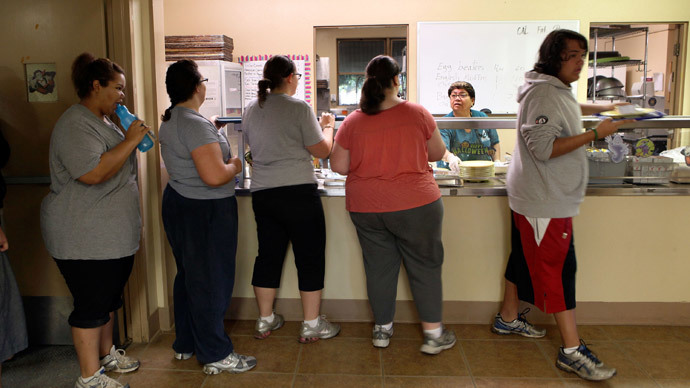Obesity price tag: $2trn annually and ‘rapidly getting worse’

Around 30 percent of the world’s population is now obese, while 50 percent is expected to fall into the category by 2030. Meanwhile, 5 percent of global deaths each year are linked to the condition, creating a drag on the global economy.
A new report by the McKinsey Global Institute (MGI) revealed the not-so-hidden cost of an increasingly sedentary population that has acquired a bad taste for fast food, and sitting for long stretches of time in traffic jams and office buildings.
READ MORE: US fast-food chains ‘disproportionately’ targeting black youth – study
More than 2.1 billion people are now clinically obese. According
to the World Health Organization, 65 percent of the world's
population lives in countries where obesity kills more people
than being underweight.
In addition to the deadly impact of obesity is the impact on the
global economy, which comes out to be about $2 trillion annually,
or 2.8 percent of global GDP.
The worldwide cost of #obesity is about same as smoking or armed conflict and greater than both alcoholism and climate change @McKinsey_MGI
— Michael Sagner M.D. (@MichaelSagnerMD) November 21, 2014
The report revealed the global cost of obesity to be “nearly
equivalent to the global impact of smoking or of armed violence,
war, and terrorism.”
"Obesity isn't just a health issue," the report's lead
author Richard Dobbs said in a podcast. "But it's a major
economic and business challenge."
Perhaps the most incredible thing about obesity is that it has
nearly doubled since 1980 and, according to MGI, “is rapidly
getting worse.”
“If the prevalence of obesity continues on its current
trajectory, almost half of the world’s adult population will be
overweight or obese by 2030,” it said.
After examining a number of plans to tackle the problem of
obesity, the report confirmed that nearly all result in some sort
of savings, for example, in lower healthcare costs for treating
diseases connected to obesity and more productivity in the
workplace.
What interventions work vs. obesity & what do they cost? @McKinsey_MGI's analysis for the UK: http://t.co/nCIa7vciAKpic.twitter.com/cGHZMnub0O
— McKinsey & Company (@McKinsey) November 20, 2014
It pointed to the United Kingdom, where intervention efforts “could reverse rising obesity, saving the National Health Service about $1.2 billion a year.”
Plans to reduce the global epidemic of global obesity will take much more than just education and personal responsibility, although these are essential factors as well, the researchers write. A solution to the problem will “rely less on conscious choices by individuals and more on changes to the environment and societal norms,” the report said.
READ MORE: Junk food ban in schools set to begin but could create black market
Changes must occur in a number of places, including in restaurants that provide “default portion sizes,” to “marketing practices” that target children and adults with advertising. It also suggests “restructuring urban and education environments” to allow for physical activities.














